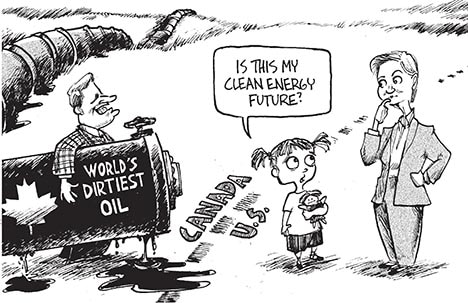A coalition of organizations composed of Friends of the Earth, the Center for International Environmental Law, and Corporate Ethics International submitted a Freedom of Information Act request [PDF] this week asking for all communications between the agency and a former presidential campaign manager for Hillary Clinton.
Paul Elliot, the lobbyist in question, served as national deputy director and chief of staff for delegate selection for Clinton’s Presidential campaign committee. He’s now a lobbyist for TransCanada, the company aiming to build the controversial 2,151 mile-long Keystone XL Pipeline.
The above organizations are concerned about how the relationship between Secretary of State Clinton and Elliot may impact the approval process for the controversial tar sands pipeline. For the coalition of watchdog organizations, this is just the latest in a series of developments that cast doubt on whether the State Department is fulfilling its obligations to conduct an exhaustive and transparent review of the environmental and public health dangers of the proposed pipeline.
According to Alex Moore of Friends of the Earth, “TransCanada clearly sees an opportunity to get this dangerous pipeline approved through Secretary Clinton’s relationship with Paul Elliott”. Afraid that the State Department will fail to do diligence in its environmental assessment of the pipeline project, they believe that this conflict of interest is reason enough for the White House to reassign review of this project to a more impartial party.
The Keystone XL Pipeline would bring 900,000 barrels a day of dirty tar sands over 2,000 miles through Montana, South Dakota, Nebraska, Kansas, Oklahoma and Texas, and a further 1,661 miles to refineries on the Gulf Coast. After two Enbridge spills in 2010, and a Chevron spill earlier this month, the threats of expanding tar sands production and distribution are heavy on people’s minds. The Canadian Association of Petroleum Producers (CAPP) is telling us the tar sands are “essentially like yogurt”, but the reality is that tar sands crude is infused with more heavy metals, sulfur and other pollutants than typical oil products.
It is not just environmental and watchdog organizations that are concerned about the controversial pipeline. Earlier this year, the pipeline generated more than a few vocal opponents including over 60 members of Congress.
Secretary Clinton’s objectivity in matters related to the pipeline have already been brought to question. In October, she received criticism for saying she was “inclined” to approve the project despite the fact that her agency was right in the midst of conducting an Environmental Impact Statement (EIS) for the project. Incidentally, Keystone ended up getting failing grade on the EIS, spurring members of Congress to call for another EIS on the controversial project.
Read more on Friends of the Earth, Center for International and Environmental Law and Corporate Ethics International FOIA request, or learn more about the Keystone XL Pipeline here.
Image Credit: ForestEthics
Subscribe to our newsletter
Stay up to date with DeSmog news and alerts






